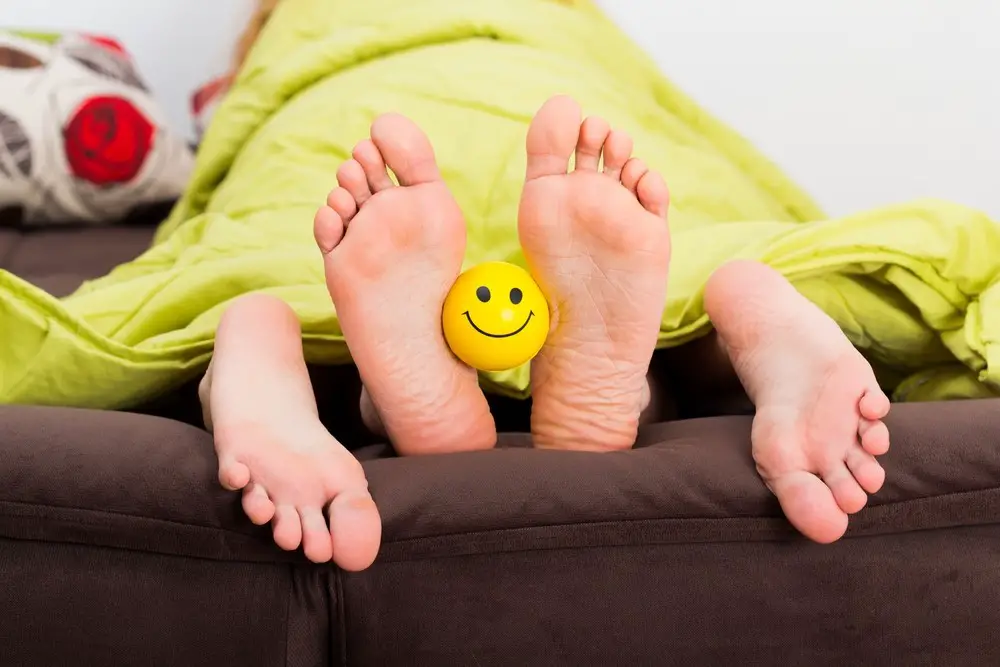As a BetterHelp affiliate, we receive compensation from BetterHelp if you purchase products or services through the links provided
Orgasm anxiety can be a significant challenge for many individuals. This common sexual concern involves worry, uneasiness, or apprehension surrounding the ability to achieve or maintain an orgasm during sexual activity. It can manifest in different forms, such as performance anxiety, fear of being judged, or concerns about one’s body or abilities. As a result, this anxiety can hinder an individual’s sexual pleasure, leading to dissatisfaction and negatively impacting their overall well-being.
Addressing orgasm anxiety is essential for improving sexual experiences and fostering healthy relationships with oneself and one’s partner. Various factors contribute to orgasm anxiety, including societal expectations, previous negative sexual encounters, and lack of proper communication. Understanding this anxiety’s root causes and manifestations is the first step in tackling this issue and moving towards a more pleasurable and fulfilling sex life.
Overcoming orgasm anxiety requires a multifaceted approach that combines self-awareness, open communication, and targeted interventions. In addition, several strategies can be employed to mitigate the effects of this anxiety, ultimately leading to improved sexual experiences and increased overall well-being. This article will delve into the intricacies of orgasm anxiety and provide resources and guidance for those looking to address this common sexual concern.
Understanding Orgasm Anxiety
Orgasm anxiety is a form of stress or apprehension people may experience regarding orgasms during sexual activities. It may manifest as difficulty reaching climax or concern about satisfying a partner during intercourse. Various factors can lead to orgasm anxiety, impacting a person’s sexual well-being and enjoyment.
Causes of Orgasm Anxiety
There are a variety of reasons why an individual might experience orgasm anxiety, including:
- Past negative sexual experiences
- Shame or stigma related to sex
- Fear of being judged or rejected by a partner
- Inadequate sexual education
- Unrealistic expectations about sexual performance and pleasure
Understanding the underlying causes of orgasm anxiety can help those affected to find solutions and regain their confidence during sexual encounters.
Performance Anxiety
Performance anxiety is a common contributor to orgasm anxiety. It emerges from thoughts and feelings of inadequacy in the context of sex, concerns about one’s appearance, and the pressure to satisfy a partner. Those experiencing performance anxiety may also feel self-conscious about their arousal and the sensations they experience.
Several factors can exacerbate performance anxiety, such as:
- Previous sexual trauma or negative experiences
- Insecurity about anatomy and sexual function
- Comparison to media portrayals of sex and pleasure
- Misconceptions about what constitutes a normal or satisfactory orgasm
Seeking professional help, such as therapy or counseling, can benefit individuals struggling with performance anxiety. They may also consider discussing their worries openly with their partner or employing relaxation techniques to reduce stress before and during sexual encounters.
Medication, such as antidepressants or anti-anxiety drugs, may sometimes be prescribed to help manage symptoms. However, discussing these options with a healthcare professional to determine an appropriate course of action is crucial.

Symptoms and Effects
Physical Symptoms
Orgasm anxiety can manifest in a variety of physical symptoms. Anorgasmia, or the inability to achieve orgasm despite adequate sexual stimulation, is one symptom. This can be caused by factors such as medical conditions affecting the nervous system or the use of antidepressants, which can interfere with sexual function.
Genital pain or discomfort during sexual activity can also be a symptom of orgasm anxiety. Again, this pain can stem from guilt, trauma, or other psychological factors that cause tension in the muscles surrounding the genitals. But, again, achieving a safe and comfortable environment for sex can help alleviate this symptom.
Mental and Emotional Effects
Mental and emotional effects are significant contributors to orgasm anxiety. Guilt, whether due to cultural or personal beliefs, can create internal conflicts that make it difficult for individuals to enjoy sexual stimulation fully. Acknowledging and addressing these feelings is crucial for overcoming orgasm anxiety.
Trauma, such as past sexual abuse or negative sexual experiences, can also contribute to feelings of fear or unworthiness associated with sex. These emotions can further impede an individual’s ability to achieve orgasm, leading to more anxiety and exacerbating sexual dysfunction.
Depression is another factor that can significantly impact an individual’s ability to achieve orgasm. It can affect both their desire for sexual stimulation and the physical response of their nervous system. Medical treatment for depression, such as counseling or medication adjustments, may help alleviate orgasm anxiety in these cases.
In addition to the adverse mental and emotional effects, orgasm anxiety can interfere with the positive aspects of a sexual relationship. Love and happiness, essential components of a satisfying sexual connection, may be overshadowed by the constant worry of not achieving orgasm. Focusing on the emotional aspects of the relationship and non-goal-oriented sexual experiences can help reduce anxiety and improve overall sexual satisfaction.
Different Types of Orgasms

Female Orgasm
The female orgasm can be triggered in various ways, most notably through clitoral stimulation. The clitoris, a sensitive part of the female genitalia, plays a significant role in achieving orgasm. In addition, many women find using sex toys, such as vibrators, helpful in providing additional clitoral stimulation for a more intense experience.
Some women experience sexual anxiety and may struggle with overcoming sexual shame, making it more challenging to achieve an orgasm. Communicating with one’s partner and building trust is essential to addressing such concerns.
Male Orgasm
Just like the female orgasm, the male orgasm also has its complexities. When a man reaches orgasm, it usually involves the release of semen through ejaculation. Blood pressure increases during the process, adding to the pleasurable sensation.
Although men may not need the same level of clitoral stimulation as women, using sex toys and incorporating different techniques can enhance the orgasmic experience. In addition, open communication between partners is crucial in navigating male orgasm preferences and addressing any sexual anxiety that may arise.
Both male and female orgasms are unique experiences that vary from individual to individual. However, by exploring different techniques and maintaining open communication, individuals can work towards more pleasurable and satisfying sexual experiences.
Overcoming Orgasm Anxiety
Therapy and Counseling
Orgasm anxiety can often be addressed through therapy and counseling. Individuals experiencing this issue might benefit from exploring their feelings and experiences in a safe, non-judgmental environment. A therapist may employ mindfulness and relaxation exercises to help reduce anxiety and improve focus during sexual experiences. For those dealing with anxiety disorders or post-traumatic stress disorder, therapy may address underlying issues contributing to orgasm anxiety.
Medication and Professional Help
In some cases, professional help may be required to manage orgasm anxiety. For example, if an individual has an anxiety disorder or depression, medications like SSRIs (e.g., Prozac) could help to regulate their mood and ease anxiety around sex. However, it’s important to note that some medicines can have side effects, such as reduced libido. Therefore, a healthcare provider should always be consulted before beginning any treatment.
Communication and Relationship Support
Open communication with a partner can play a significant role in overcoming orgasm anxiety. Discussing fears and concerns allows couples to work together to create a comfortable and supportive environment. In addition, incorporating activities like mutual masturbation can help build trust and confidence in one’s ability to experience orgasm.
Introducing relaxation techniques, such as deep breathing exercises, into the sexual routine can further reduce anxiety levels. Additionally, focusing on the pleasurable sensations of touch and connection, rather than the goal of orgasm, can help alleviate performance pressure.
When dealing with orgasm anxiety, it’s essential to remember that support and patience are key factors in overcoming the issue. By combining therapy, medication if necessary, and strong communication with a partner, individuals can work towards a healthier and more fulfilling sex life.
Enhancing Sexual Pleasure
Multiple Orgasms
Achieving multiple orgasms can be a pleasurable experience for many individuals. While some may think that those with a clitoral orgasm primarily experience multiple orgasms, it’s important to note that individuals with vaginal orgasms and erectile issues can also experience them. Therefore, it’s beneficial to consult a mental health professional to discuss any concerns or challenges regarding orgasm anxiety or orgasmic patterns.
Exploring Erogenous Zones
Discovering and stimulating erogenous zones can enhance sexual intimacy and pleasure. Every individual’s map of erogenous zones may differ, with some areas being more sensitive than others. The body is filled with pleasure receptors that can be stimulated with fingers, mouths, and other types of touch. Remember to communicate openly with your partner to create a shameless and consensual experience, exploring new areas and enjoying the pleasure of touch.
Mindful Sexual Practices
Techniques like slow sex and mindfulness can contribute to a heightened level of sexual connection and fulfillment. Slowing down the pace of sexual interactions allows individuals to savor the sensations, focus on their partner’s pleasure, and can potentially lead to earth-shattering climaxes. In addition, practicing mindfulness during sex helps maintain a sane and consensual atmosphere, regulates heart and breathing rates, and can result in numerous health benefits.
Moreover, by shifting focus away from goal-oriented pleasure, such as reaching an orgasm, individuals are more likely to embrace sexual intimacy without pressure or anxiety. The Diagnostic and Statistical Manual of Mental Disorders (DSM) provides valuable insight into mental health and misconceptions surrounding pleasure, helping people better understand their sexual desires and patterns.
FAQs
- 7 Ideas to Help You Relax and Unwind on a Family Vacation - April 27, 2025
- How Having Cybersecurity Protection Helps You Relax - April 25, 2025
- 8 Reasons Why Spending Time Outside Calms You Down - April 25, 2025
This site contains affiliate links to products. We will receive a commission for purchases made through these links.



